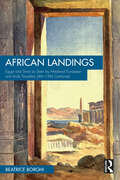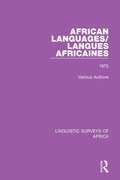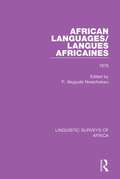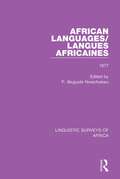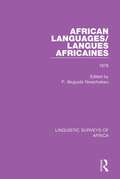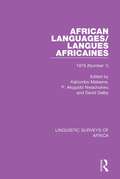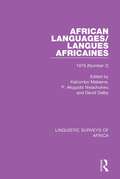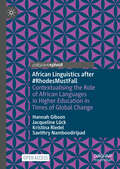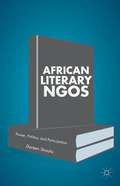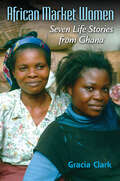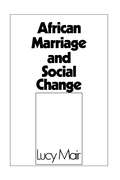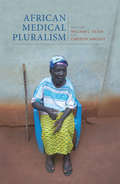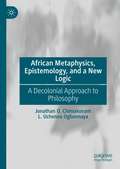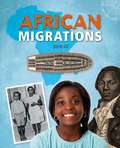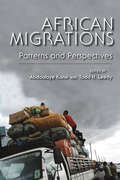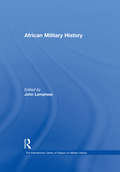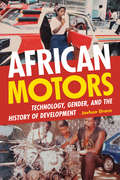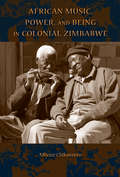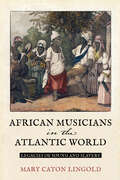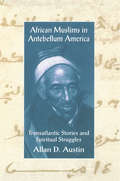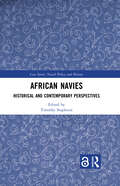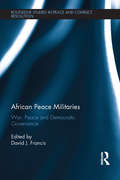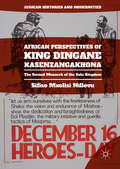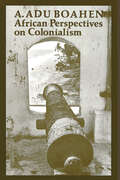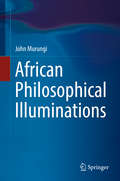- Table View
- List View
African Landings: Egypt and Sinai as Seen by Medieval European and Arab Travellers (4th–15th Centuries)
by Beatrice BorghiThis book seeks to break free from Eurocentric historical perspectives of medieval-era travel through Egypt and Sinai by focusing on the testimonies of 4th to 15th-century travellers from the African continent, especially pilgrim diaries from the Arab Muslim Egyptian world.Humanity's past is the story of movements by peoples who reshaped and redefined their identity and reported their impressions to a gradually diversified public—migratory currents that transported not just goods but ideas, intellect, culture and inventions. Focusing on Egypt in the Middle Ages—its cities, its suburbs and hinterland, and the many faces of its landscape—can provide us with answers to topical issues, as well as a new and better understanding of Levantine Mediterranean history. These diaries tell of objects, calendars, written works and artworks, sculptures, frescoes, monuments, musical instruments, animals, foodstuffs, and finally, of material and immaterial heritages—all valuable sources for understanding world history and posing questions about their, and our own, preconceptions.This volume will be of interest to students, scholars, and general readers of medieval history, Mediterranean history, travel history, and religious history.
African Languages/Langues Africaines: Volume 1 1975 (Linguistic Surveys of Africa #23)
by Various AuthorsVolume 1 of African Languages include articles originally published in 1975 and written in French and English on educational, literary, cultural, historical and socio-linguistic aspects of language in Africa, as well as descriptive and comparative studies. Among others there are chapters on African oral literature, the standardization of languages and education in Nigeria and a description of Shona spelling.
African Languages/Langues Africaines: Volume 2 1976 (Linguistic Surveys of Africa #24)
by P. AkỤjỤobi NwachukwuVolume 2 of African Languages includes articles originally published in 1976, written in French and English on educational, literary, cultural, historical and socio-linguistic aspects of language in Africa, as well as descriptive and comparative studies. Among others there are chapters on an early Vai manuscript from Liberia, John Clarke's unidentified Nago dialect and swahili secondary education in Tanzania.
African Languages/Langues Africaines: Volume 3 1977 (Linguistic Surveys of Africa #25)
by P. AkỤJỤobi NwachukwuVolume 3 of African Languages includes articles originally published in 1977, written in French and English on educational, literary, cultural, historical and socio-linguistic aspects of language in Africa, as well as descriptive and comparative studies. Among others there are chapters on the national language issue in Africa (Akan in Ghana), a socio-linguistic case study of the Hausa language in Nigeria and assimiliation and lexical coinages in Igbo.
African Languages/Langues Africaines: Volume 4 1978 (Linguistic Surveys of Africa #26)
by P. Akụjụobi NwachukwuVolume 4 of African Languages includes articles originally published in 1978, written in French and English on educational, literary, cultural, historical and socio-linguistic aspects of language in Africa, as well as descriptive and comparative studies. Among others there are chapters on lexical innovation in Zambian languages, Portuguese creole of Sénégal, the application of ethics in Hausa didactic poetry.
African Languages/Langues Africaines: Volume 5 (1) 1979 (Linguistic Surveys of Africa #27)
by David Dalby Kahombo Mateene P. AkụJụobi NwachukwuVolume 5 (1) of African Languages originally published in 1979, is a special issue focussing on the Bantu languages in Tanzania. The languages are discussed according to 4 regions of Tanzania and although the sub-grouping is lexicostatistical, the classification is borne out by other consdierations, such as phonology and verbal morphology.
African Languages/Langues Africaines: Volume 5 (2) 1979 (Linguistic Surveys of Africa #28)
by David Dalby Kahombo Mateene P. AkụJụobi NwachukwuVolume 5 (2) of African Languages originally published in 1979, is a special issue focussing on languages and education in Africa. There are chapters on African language education from a socio-linguistic perspective, the problems of bi-lingualism and multi-lingualism in Zaire and small languages in primary education.
African Linguistics after #RhodesMustFall: Contextualising the Role of African Languages in Higher Education in Times of Global Change
by Hannah Gibson Jacqueline Lück Kristina Riedel Savithry NamboodiripadThis open access book explores the link between African languages, decolonisation and transformation. It has its origins in a survey of students and instructors at higher education institutions both inside and outside Africa, and takes as a starting point the 2015 student-led #RhodesMustFall movement which spread across universities in South Africa. Many of the questions being asked by #RhodesMustFall found parallels in ongoing discussions across in Europe and North America. This book presents findings from the survey, set against the broader backdrop of calls for decolonisation and transformation, drawing specifically on linguistics teaching, scholarship and research. The findings provide new insights into how African languages and linguistics are framed and engaged with, amidst decolonial struggles in higher education. This book will be relevant to readers with an interest in African languages, social justice, higher education, and decolonisation.
African Literary NGOs: Power, Politics, and Participation
by Doreen StauhsProposing the novel concept of the "literary NGO," this study combines interviews with contemporary East African writers with an analysis of their professional activities and the cultural funding sector to make an original contribution to African literary criticism and cultural studies.
African Market Women: Seven Life Stories from Ghana
by Gracia C. Clark“A wonderfully evocative compilation of seven life histories from Kumasi, Ghana, of women Gracia Clark encountered in the course of a lifetime of fieldwork.” —African Studies ReviewIn these lively life stories, women market traders from Ghana comment on changing social and economic times and on reasons for their prosperity or decline in fortunes. Gracia Clark shows that market women are intimately connected with economic policy on a global scale. Many work at the intersection of sophisticated networks of transnational commerce and migration. They have dramatic memories of independence and the growth of their new nation, including political rivalries, price controls, and violent raids on the market. The experiences of these women give substance to their reflections on globalization, capital accumulation, colonialism, technological change, environmental degradation, teenage pregnancy, marriage, children, changing gender roles, and spirituality. Clark’s commentary illuminates the complex historical and cultural setting of these deeply revealing lives.“Shows, in direct speech, how family, kinship, marriage and age/generation work together in a daily life which is shaped by political, demographic, cultural, and wholly accidental change in people’s circumstances.” —Jane Guyer, Johns Hopkins University“Overall, this is an excellent book: it will be useful in undergraduate teaching and makes an important contribution to our understanding of the richness and variety of women’s lives in West Africa.” —Journal of Africa“Clark . . . offers intriguing insights into the lives of seven Akan women traders . . . Recommended.” —Choice
African Marriage and Social Change
by Lucy P. MairFirst Published in 1969. Routledge is an imprint of Taylor & Francis, an informa company.
African Medical Pluralism
by William C. Olsen Carolyn SargentIn most places on the African continent, multiple health care options exist and patients draw on a therapeutic continuum that ranges from traditional medicine and religious healing to the latest in biomedical technology. The ethnographically based essays in this volume highlight African ways of perceiving sickness, making sense of and treating suffering, and thinking about health care to reveal the range and practice of everyday medicine in Africa through historical, political, and economic contexts.
African Metaphysics, Epistemology and a New Logic: A Decolonial Approach to Philosophy
by Jonathan O. Chimakonam L. Uchenna OgbonnayaThis book focuses on African metaphysics and epistemology, and is an exercise in decoloniality. The authors describe their approach to "decoloniality" as an intellectual repudiation of coloniality, using the method of conversational thinking grounded in Ezumezu logic. Focusing specifically on both African metaphysics and African epistemology, the authors put forward theories formulated to stimulate fresh debates and extend the frontiers of learning in the field. They emphasize that this book is not a project in comparative philosophy, nor is it geared towards making Africa/ns the object/subjects of philosophy. Rather, the book highlights and discusses philosophical insights that have been produced from the African perspective, which the authors argue must be further developed in order to achieve decoloniality in the field of philosophy more broadly.
African Migrations
by Hakim AdiDiscover the fascinating history of African migration, from thousands of years ago to the 21st Century.Newly updated, African Migrations explores the history of migration from Africa, from the forced migrations of slavery and the experiences of life in the Americas to the political and economic migrations of more recent times. Experiences are brought to life with case studies of children from the 20th and 21st centuries.Written by British historian and academic Hakim Adi, Profressor of the History of Africa and the African diaspora at the University of Chichester, this book is essential reading for children aged 11+ and anyone interested in learning about African migrations.
African Migrations: Patterns And Perspectives
by Todd H. Leedy Abdoulaye KaneSpurred by major changes in the world economy and in local ecology, the contemporary migration of Africans, both within the continent and to various destinations in Europe and North America, has seriously affected thousands of lives and livelihoods. The contributors to this volume, reflecting a variety of disciplinary perspectives, examine the causes and consequences of this new migration. The essays cover topics such as rural-urban migration into African cities, transnational migration, and the experience of immigrants abroad, as well as the issues surrounding migrant identity and how Africans re-create community and strive to maintain ethnic, gender, national, and religious ties to their former homes.
African Military History (The International Library of Essays on Military History)
by John LamphearThis collection of essays on pre-colonial sub-Saharan African military history is drawn from a number of academic journals and includes some which are considered milestones in African historiographical discourse, as well as others which, while lesser known, provide remarkable insight into the unique nature of African military history. Selections were made so as to produce an introduction to the understudied field of pre-colonial African military history that will be useful to specialists and non-specialists alike. The volume also contains an introduction which presents one of the first significant reviews of pre-colonial African military historiography ever attempted.
African Motors: Technology, Gender, and the History of Development
by Joshua GraceIn African Motors, Joshua Grace examines how Tanzanian drivers, mechanics, and passengers reconstituted the automobile into a uniquely African form between the late 1800s and the early 2000s. Drawing on hundreds of oral histories, extensive archival research, and his ethnographic fieldwork as an apprentice in Dar es Salaam's network of garages, Grace counters the pervasive narratives that Africa is incompatible with technology and that the African use of cars is merely an appropriation of technology created elsewhere. Although automobiles were invented in Europe and introduced as part of colonial rule, Grace shows how Tanzanians transformed them, increasingly associating their own car use with maendeleo, the Kiswahili word for progress or development. Focusing on the formation of masculinities based in automotive cultures, Grace also outlines the process through which African men remade themselves and their communities by adapting technological objects and systems for local purposes. Ultimately, African Motors is an African-centered story of development featuring everyday examples of Africans forging both individual and collective cultures of social and technological wellbeing through movement, making, and repair.
African Music, Power, and Being in Colonial Zimbabwe
by Mhoze ChikoweroIn this new history of music in Zimbabwe, Mhoze Chikowero deftly uses African sources to interrogate the copious colonial archive, reading it as a confessional voice along and against the grain to write a complex history of music, colonialism, and African self-liberation. Chikowero's book begins in the 1890s with missionary crusades against African performative cultures and African students being inducted into mission bands, which contextualize the music of segregated urban and mining company dance halls in the 1930s, and he builds genealogies of the Chimurenga music later popularized by guerrilla artists like Dorothy Masuku, Zexie Manatsa, Thomas Mapfumo, and others in the 1970s. Chikowero shows how Africans deployed their music and indigenous knowledge systems to fight for their freedom from British colonial domination and to assert their cultural sovereignty.
African Musicians in the Atlantic World: Legacies of Sound and Slavery (New World Studies)
by Mary Caton LingoldMusic, that fundamental form of human expression, is one of the most powerful cultural continuities fostered by enslaved Africans and their descendants throughout the Americas. The roots of so much of the music beloved around the world today are drawn directly from the men and women carried across the Atlantic in chains, from the west coast of Africa to the shores of the so-called New World. This important new book bridges African diaspora studies, music studies, and transatlantic and colonial American literature to trace the lineage of African and African diasporic musical life in the early modern period.Mary Caton Lingold meticulously analyzes surviving sources, especially European travelogues, to recover the lives of African performers, the sounds they created, and the meaning their musical creations held in Africa and later for enslaved communities in the Caribbean and throughout the plantation Americas. The book provides a rich history of early African sound and a revelatory analysis of the many ways that music shaped enslavement and colonization in the Americas.
African Muslims in Antebellum America: Transatlantic Stories and Spiritual Struggles
by Allan D. AustinA condensation and updating of his African Muslims in Antebellum America: A Sourcebook (1984), noted scholar of antebellum black writing and history Dr. Allan D. Austin explores, via portraits, documents, maps, and texts, the lives of 50 sub-Saharan non-peasant Muslim Africans caught in the slave trade between 1730 and 1860. Also includes five maps.
African Navies: Historical and Contemporary Perspectives (Cass Series: Naval Policy and History)
by Timothy StapletonThis edited volume focuses on aspects of the understudied theme of African sea-power, including African navies and the engagement of non-African navies with the continent. Africa possesses 48,000 kilometers of coastline, comprising 38 out of 54 of the continent’s states and several strategic choke points for international shipping, such as the Suez Canal, the Gulf of Aden and the Cape of Good Hope. Nevertheless, post-colonial Africa’s small navies and their relations with the navies of external powers have not received much scholarly attention. Focusing on Sub-Saharan Africa, this collection attempts to address this neglect and stimulate further research by offering original chapters related to historical and contemporary themes around Africa’s navies. The historical chapters cover the origin of the Tanzanian, Ethiopian, Nigerian and Ghana navies during the era of decolonization and the Cold War, the asymmetrical naval campaign fought during the Nigerian Civil War (1967-70), and the activities of the Soviet Navy in supporting African states and movements fighting lingering colonialism and white supremacy during the 1970s and 1980s. Focusing on the contemporary situation, other chapters discuss the engagement of the Indian Navy with Africa, the potential role of the Angolan and Mozambican navies in the Southern African Development Community (SADC), the transformation and development of the post-apartheid South African Navy, and the challenges and capabilities of African navies in the early twenty-first century. The book concludes by discussing the question of whether African coastal countries need navies. This book will be of much interest to students of naval power, strategic studies, African politics and International Relations.
African Peace Militaries: War, Peace and Democratic Governance (Routledge Studies in Peace and Conflict Resolution)
by Edited by David J. FrancisThis book provides a critical understanding of the emerging role of African militaries in peacetime democratic Africa. This book departs from the dominant perspective which simply presents the military as an ‘enemy’ of democracy because of the history and legacy of unending military coup d’états and interventions in civilian politics. In the context of Africa, the military has been blamed or largely held responsible for instigating wars, armed conflicts, political violence, poverty and underdevelopment due to bad governance and mismanagement of the state. Drawing from diverse case studies across Africa, including Nigeria, Rwanda, Uganda, Ethiopia and Egypt, this volume presents the argument that though the military has played a negative, and sometimes, destructive role in undermining constitutional rule and the overthrow of democratic civilian governments, the same military, now operating in a changed global environment, is making effort to support the development of democracy and democratic consolidation as well as remain subjected to civilian democratic oversight and control. Notwithstanding, the real challenge for this emerging trend of African peace militaries is the extent to which they are able to fulfil, on a predictable and consistent basis, their constitutional mandate to defend the people against ‘elected autocrats’ in Africa who try to use the military to perpetuate themselves in power. This work fills a critical gap in the literature and will be of much interest to students of African security and politics, peace and conflict studies, security studies and IR in general.
African Perspectives of King Dingane kaSenzangakhona: The Second Monarch of the Zulu Kingdom (African Histories and Modernities)
by Sifiso Mxolisi NdlovuThis book examines the active role played by Africans in the pre-colonial production of historical knowledge in South Africa, focusing on perspectives of the second king of amaZulu, King Dingane. It draws upon a wealth of oral traditions, izibongo, and the work of public intellectuals such as Magolwane kaMkhathini Jiyane and Mshongweni to present African perspectives of King Dingane as multifaceted, and in some cases, constructed according to socio-political formations and aimed at particular audiences. By bringing African perspectives to the fore, this innovative historiography centralizes indigenous African languages in the production of historical knowledge.
African Perspectives on Colonialism (The Johns Hopkins Symposia in Comparative History #15)
by A. Adu BoahenThis history deals with the twenty-year period between 1880 and 1900, when virtually all of Africa was seized and occupied by the Imperial Powers of Europe. Eurocentric points of view have dominated the study of this era, but in this book, one of Africa's leading historians reinterprets the colonial experiences from the perspective of the colonized. The Johns Hopkins Symposia in Comparative History are occasional volumes sponsored by the Department of History at the Johns Hopkins University and the Johns Hopkins University Press comprising original essays by leading scholars in the United States and other countries. Each volume considers, from a comparative perspective, an important topic of current historical interest. The present volume is the fifteenth. Its preparation has been assisted by the James S. Schouler Lecture Fund.
African Philosophical Illuminations
by John MurungiThe illumination of African philosophy offered in this volume leads to the illumination of philosophy in general. Illuminating arises as an essential task of philosophy, whether African or not. What is illuminated is not already there, but is constituted at the moment of illumination. This book invites the reader to participate in the illuminating work of philosophy and necessarily, thereby, to contribute to his or her own self-constituting self-illumination. Although the focus is on African philosophy, the book also bridges the gap between African philosophy and other branches. Today more than ever, a bridging philosophy is called for, and this book helps to meet that need. This book poses philosophical questions such as who is an African and what Africa is, and seeks philosophical answers. In doing so, it contributes to the ongoing discourse on African philosophy. It addresses such issues as the African grounding of philosophy, the difference between African and Black philosophy, the African body, African art as expressed in and by Chiwara, the plight of African trees as the plight of Africans, and the symbolic meaning of Robben Island.
